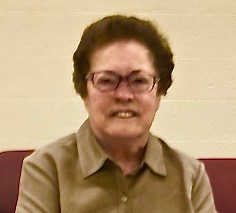News Posts List
Recovery Reporter 2019 Summer
07/01/2019
Recovery Reporter 2019 Summer
.jpg)
- Welcome to Summer
- News from Headquarters - Annual Meeting Recap
- Stories of Hope - Surviving Obsessive Compulsive Disorder: One Man's Journey by James C.
- Stories of Hope Audio interviews on SoundCloud
- Wisdom of Dr. Low - Overcoming the handicap of TIME
- Recovery Examples
- Roaming the Globe - Featuring India
- Members Corner - In recognition of long-time members - thank you!
Welcome to Summer!

The idea of summer typically conjures up images of care free days and easy-going times that are relaxing and recharging. In reality though, that may be the things dreams are made of! No worries, we have a recovery practice that can reduce our nervous symptoms and help to make this a calm and healthy summer.
"And since now nervous symptoms are due to lack of relaxation, the thing seems clearly to point to the fact that if you want to get rid of your nervous symptoms, you must establish, or re-establish, relaxation. You can call it peace. You can call it equilibrium. You can call it adjustment, but, essentially, it is relaxation." - Manage Your Fears, Manage Your Anger page 222
What’s so stressful about Summer?
Well summer may be just like any other time of year and certainly we can work up a temper in any season! Summertime is generally hotter, which may be hard to adjust to and it can mean changes in schedules – and as we all know, we don’t care much for change and this can be challenging. We also may put pressure on ourselves: the weather is nice so we should be out enjoying it, we should be doing this and we should be doing that. If we own a home, we may have a lot more extra work dealing with our yard as well as the added expense of taking care of the exterior – perhaps having to hire a contractor and/or scheduling time when we are doing the work ourselves.
We may need to change up our self-care routine. Self-care is different for everyone and it doesn’t have to be this big production. It can be as easy as finding those times where we’re not surrounded by anybody and we can actually spend time alone. Or the total opposite, where we can plan to be more social, attending outdoor events or having a get together ourselves.
The one constant? Don’t judge ourselves: There is no wrong or right way to do self-care, and we will be more relaxed knowing that it’s just average to have bumps in the road, so get your summertime mojo in gear, just don’t forget you’ve got plenty of RI tools to get wherever you’re going!
Here are a few suggestions that can help reduce stress this summer:
- Let go of the shoulds. Stop pressuring ourselves with summer activities we may think we should/shouldn’t be doing. Instead, we can resolve ourselves simply, “what of it!!” if I miss an event or cancel one. We can decide plan and act when it comes to decisions about attending events or inviting folks over for our own summer event.
- We can bring calm and peace to each day by creating moments of relaxation and fun throughout the day, no matter what else it brings.
- We can lower our expectations by taking short strolls around the neighborhood instead of planning an all-day outing or lengthy hike.
- All and all we can take things as they come and enjoy all the best things this season has to offer!
.jpg)
HAPPY SUMMER from your Recovery Reporter Editors: David W., Editor in Chief, Helen P., Managing Editor
We would like thank all of our contributors, without whom the Recovery Reporter would not be possible. Before sending submissions, please read the submission guidelines at the bottom of the Reporter from your temperamental editors!
.jpg) ARCHIVAL MATERIALS
ARCHIVAL MATERIALS
Sweepstakes winners and everyone else interested in Dr. Low’s original publications, we are bringing you a special bonus to accompany these amazing original archives:
* Group Psychotherapy – Recovery’s original textbook
* Four case studies by Dr. Low
COMING THIS FALL!!! We are still in the process of putting it together for you! The wait won’t be a disappointment.
Your editors thank you for being the patient patient! (Please click this link editor@recoveryinternational.org to be added to the list, if you are not already on it.)
News from Headquarters
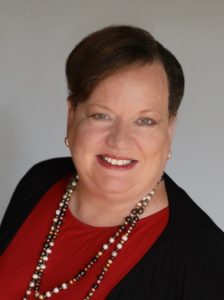
We are so Grateful!
Anonymous Donor, California
Saul Haber, Maryland
Harold Koebke, Massachussetts
Phillip Mancuso, New Jersey
Stephen Millard, New Hampshire
Irene Scheffler, Michigan
Harold Van Deest, Tennesee
Beverly Zweig, New York
What do these people have in common? They all remembered Recovery International in their wills and estate plans. Because of their foresight and group-mindedness, our programs will continue to grow and evolve to serve the next generation.
Have you thought of “paying it forward” with an estate gift? It’s as simple as including a sentence leaving a specific amount or percentage in your will to Recovery International. Contact Sandra at 312-962-5991 or swilcoxon@recoveryinternational.org if you need assistance or more information. We are so grateful to these thoughtful and generous friends!
Annual Meeting Recap
Fifty people gathered at Recovery International’s recent Annual Meeting in Brooklyn, New York to meet Board Members, interact with each other, and share stories and ideas. Leaders and members came from throughout the region and as far away as Ohio. A special thanks go out to Anthony Ferrigno and Holly Weiss for their assistance! (If your area would like to host a future Annual Meeting, please let Josie know).
Annual Meeting Remarks from Sandra Wilcoxon, CEO
Recovery International is all about people—people who care about helping others – our leaders, volunteers, members, donors, meeting participants and staff. We couldn’t function without everyone pitching in to do their part—THANK YOU!
A lot happened in the past year, many things which you have read about in the Reporter. I believe our two major accomplishments in 2018 were conducting the summer survey of members and donors and holding the October Conference in Chicago. Both of these were opportunities to connect with our leaders and members—to hear your thoughts and ideas as we planned for the future of Recovery. This is very important as we have to face some tough decisions.
We have been hearing from our leaders across the United States as well as in Canada and Ireland that attendance at Recovery meetings has been declining. In the past four years, more than 80 meetings have closed, and only a handful have opened. We have relied on bequests and one-time fund transfers to balance the budget for the past two years.
Yes, we have increased contributions and grants a bit, but more must be done. Telephone meetings and online meetings are growing, and we must do more to support these and other ways that people can participate in the Recovery Method if they don’t have access to a community meeting.
In short, Recovery International must evolve. We need to reach younger people, we need to mentor and train new leaders, and we need to develop new sources of revenues. Toward this end, we’ve started some new projects:
- Our new website – designed to provide more information about our programs, and to invite people to browse the site to learn more about how Recovery can help them.
- Two of our books are now available on Amazon – so people can now find new books there (not just second-hand books) and Kindle versions will be available soon.
- We have entered into a licensing agreement with corporate consulting firm Dillon/Marcus to introduce Spot-It, an online course to use Recovery methods to reduce stress and anxiety in the workplace.
- We will be transferring some of our archival materials to the American Psychiatric Association Archives, so they can be digitized and made available for study and research.
- We are working on a special grant-funded initiative to train new leaders and open new meetings in the LA area, which we hope may serve as a model to take to other areas in the future.
- We will update and re-introduce the Power to Change program for youth.
- We will convene a Professional Advisory Board and seek out strategic partnerships with other organizations to aid in re-building visibility among professionals.
We need your help to evolve, too!
Encourage all your meeting participants to become members. We estimate that less than 30% of meeting participants are members….Membership helps with their Recovery practice as they will receive the Reporter, have access to member-only telephone meetings, and other benefits. Right now, members who log in to the Member Only section on our new website can download a FREE e-book PDF version of “Selections of Dr. Low’s Lectures.”
We also ask our leaders to take time this year to identify and mentor new leaders from among your meeting participants. Be ready to “Pass the Baton!” Take a sabbatical year or two from being a leader, and take pride in watching someone else grow into a leadership position. Consider becoming more involved in Area Leadership, promoting Recovery at resource fairs, or joining one of our working committees or the board.
These are all ways you can evolve your own participation in Recovery International, help us grow and evolve as an organization, and help us help others achieve better mental health. Thank you,
And—don’t forget to endorse!
.jpg)
Sandra K. Wilcoxon, CEO
Stories of Hope
My RI first meeting was in 1976. At that time, my primary problem was insomnia. I found the RI method of lying still in bed very difficult but to my surprise effective. I have used the RI method for a variety of other symptoms including anxiety and obsessive thoughts. After I retired, I took advantage of the Amazon tool of providing a free format for persons wishing to self-publish books and self-published a book about my own life-experiences of living with Obsessive Compulsive Disorder (OCD). I devoted a whole chapter to RI explaining how helpful it was to me in my search for recovery. The book is titled: SURVIVING OBSESSIVE COMPULSIVE DISORDER: ONE MAN'S JOURNEY by James Coleman. The electronic version that can be downloaded and sells for 2.99. I attempted in the chapter on RI to show the similarities between RI and current cognitive-behavior methods, including the early historical connection of the RI to modern methods.
Stories of Hope Audio series

Tune in to our Audio Interviewing Series with members and special guests here!
If you know someone who could benefit from the RI Method or a professional who might recommend us to clients, please copy this link into an email and send it to them: https://soundcloud.com/recovery-international/
Wisdom of Dr. Low – Overcoming the Handicap of TIME
.jpg) If they have been developed and retained for months and years, like with my patients, then the habits resist being changed. And if it is a habit of thinking in a certain manner, a habitual belief, then the patient particularly is likely to become addicted to the belief. And then how am I going to remove that addiction? We call it an obsession, and patients have plenty of obsessions. But that’s no problem, and I soon found out it wasn’t a problem. Oh, it was a problem, but not an insuperable problem, not a problem impossible of solution. And the answer to this problem was simply take your time and give training, continuous training, persevering training, and then you overcome the handicap of time. Time can be crowded out by other time. This stale time, this time that got stuck, can be eliminated by waiting, by your spending time till this thing that got stuck will disappear. And in life everything disappears. It may come back, but in life everything moves provided you let the thing go. Then it will gradually go; provided you let it come back, it will come back. And that requires training, and you must learn the technique of not working up an experience....continued Manage Your Fears, Manage Your Anger page 268
If they have been developed and retained for months and years, like with my patients, then the habits resist being changed. And if it is a habit of thinking in a certain manner, a habitual belief, then the patient particularly is likely to become addicted to the belief. And then how am I going to remove that addiction? We call it an obsession, and patients have plenty of obsessions. But that’s no problem, and I soon found out it wasn’t a problem. Oh, it was a problem, but not an insuperable problem, not a problem impossible of solution. And the answer to this problem was simply take your time and give training, continuous training, persevering training, and then you overcome the handicap of time. Time can be crowded out by other time. This stale time, this time that got stuck, can be eliminated by waiting, by your spending time till this thing that got stuck will disappear. And in life everything disappears. It may come back, but in life everything moves provided you let the thing go. Then it will gradually go; provided you let it come back, it will come back. And that requires training, and you must learn the technique of not working up an experience....continued Manage Your Fears, Manage Your Anger page 268
Recovery Examples
Worry is the favorite hobby of the nervous person
Step 1. I had a doctor's appointment yesterday. I had to wait 30 minutes because they were running behind schedule, the waiting room was crowded, my cell phone reception wouldn't work, and a woman had a constant, loud cough. I began to work myself up and was in temper and symptoms.
Step 2. The symptoms I experienced were physical tenseness in my body, jaw, and neck. The mental symptoms were angry and fearful thoughts, disturbing impulses, lowered and raised feelings.
Step 3. I spot angry temper: resentment and impatience, at having to wait, and disgust at the woman coughing. I spot fearful temper: discouragement, embarrassment, worry, and despair.
The spots I used were, people, places, things and events don't work me up - I work myself up. Excuse the woman coughing rather than accuse for the sake of my mental health. Bear the discomfort and the comfort will follow. Worry is the favorite hobby of the nervous person.
I self-endorse: I am here now making a business of my mental health and working RI. When the will to effort exceeds the will to comfort, we get better.
Step 4. Before I had my Recovery training I would've said something aggressive to the receptionist. Yesterday I said something funny to her: a sense of humor will kill a sense of temper.
Great improvement over former days
I’m not sure what to do when I’m trying to focus on my study and there are some distractions.
My symptom is confusion.
I have fearful temper – feelings of inadequacy. I used spots like: calm begets calm, temper begets temper; there’s no danger; it’s phasic not basic; trust your basic function; it’s the outer environment. I endorse for using recovery
Before my recovery training I was in symptoms. I can reduce my symptoms after using recovery.
Stephanie
(Click here to listen to Stephanie’s interview on the RI SoundCloud page)
Anticipation is often worse than realization
Situation: I received an email from a day program I had attended. One of the social workers had asked me if I would come and do an RI presentation for a group of her patients. That is when I began to work myself up.
Symptoms: Lowered feelings-tightness in the chest-felt like crying-feelings of inadequacy.
Spotting: Fearful temper-we are a capable lot unless we paralyze ourselves with our fears-any decision will steady us-plan decide and act-anticipation is always worse than the realization-fear of the permanent handicap-endorse for my effort
Before Recovery: Something like this would have put be in bed and I would have had thoughts of suicide. Before RI, I didn’t know all I have to do is an average job not an exceptional one. I didn’t know that I wouldn’t be wrong if I said no. I was able to tell the person I would contact her when it was convenient for me. Once a month myself and a few other leaders do an RI presentation at the day program.
Thank you, RI, for showing me how to live a more peaceful life and not having to be a people pleaser.
Cindy from NJ area 155
Bear the discomfort in order to gain comfort
I read in the biography My Dear Ones that Dr. Low was not fond of modern, labor-saving devices. It said that he felt that they were making things too easy and taking the effort out of daily life. But why would we want effort? Isn’t freedom from hardship what gives us peace of mind? It seems to me that Dr. Low thought differently.
My reading of Dr. Low’s work leads me to believe that his research and practice revealed that maintaining a stable inner environment during hardship and effort are what actually lead to peace of mind. I haven’t read anywhere that Dr. Low wanted to get rid of technology or efficiency in our domestic life, but he suggested that before our “modern age” people had better tools for managing their state of mind during hardship. Did we forget these tools for self-management when modern conveniences and the culture of comfort took away opportunities to employ their use? If so, then we are fortunate that Dr. Low’s Method requires us to rebuild these skills.
As pre-modern challenges disappear, it is imperative that we adhere to diligent use of Dr. Low’s Method and apply it to the trivialities we encounter. With proper use of these tools comes a decrease in symptoms which can be maintained while advancing technology and efficiency render redundant the efforts required in earlier days.
Paul B.
There is a final cure!
In 1998, I was having some mental problems and was being helped by a psychiatrist. In June of that year, I read an article in the newspaper by an advice columnist named Anne Landers. She advised if you’re having mental problems, attend a meeting put on by a group named Recovery. So in July, I started attending Recovery meetings. I took to Recovery like a duck to water. I quickly read all the books and literature. Unfortunately, I was only able to attend meetings for four months because on Nov. 2, I started a new job.
However, here is the significant thing. Those four months have lasted me every day since 1998. That’s because Recovery permanently changed my way of thinking and gave me tools to work with in maintaining my mental health. Over the years, I have managed to maintain my membership in RI and even make donations to RI at least once a year. I also review, in a timely fashion, my Recovery books and literature including the RI Discovery Workbook and Power Tools Cards (both copyright 2014). And, of course, I always read the Recovery Reporter.
My wife is a member of AA. They have a saying that certainly applies to RI: “Keep coming back. It works if you work it.”
Thanks RI!
Jack K., Dallas TX
Click on the icons below for more examples and stories from RI members.
 |
 |
 |
||
| Chat room | Meetings | SoundCloud |
If you have questions, email info@recoveryinternational.org.
Roaming the Globe
![]()
INDIA
.png)
RI's SUCCESS "There's no other continuum that works like this!"
This essay is based on a series of three articles written by Anil Vartek, Vice-President of the Schizophrenia Awareness Association (SAA) in Pune. Prof. Vartek underwent leader training in Chicago and brought back the Recovery Method to India. The full text of the articles can be accessed here.
Go to the SAA website to learn more about SAA's Recovery meetings, under these menus: About Us - Self-help Support Groups, FAQS - Recovery Method and Personal Experiences - Examples of Recovery Method.
Keeping symptoms of mental health in check and ensuring continuous improvements is a long process. Psychiatric treatment and medication is extremely helpful to improve conditions to a certain extent, but many find it difficult to sustain this improvement long term. Based on his experience with patients, American psychiatrist Dr. Abraham Low developed a method to help maintain improvements in those with mental health challenges, but also found that it worked with those with average everyday distresses as well. Known since 1937 as the Recovery Method, it continues to be used globally.
The Recovery Method became the first Peer to Peer Recovery Practice. Outpatients or patients who were discharged from the hospital often found that the effects of the treatment could not be sustained in the long run. Symptoms increased as patients struggled with their daily lives, ultimately leading to relapse. The practice proved that people could regulate their own thoughts, control unstable thoughts and purposefully recall stabilizing thoughts. By recalling the Recovery Method tools such as, “I can only control my internal environment, not my external environment,” people could learn to control extreme manifestations of rage, anger and emotional outbursts. Chances of relapse were reduced substantially with the regular practice of the Recovery tools. Dr. Low’s method found great success in helping patients to achieve stability and peace.
Today there are hundreds of meeting world-wide. There is no hierarchy in these meetings. Even the group leader shares his or her experiences in the same as any other group member. In the beginning of each meeting, a few paragraphs from Dr. Low's books are read, followed by a time when members share a recent distressing event in a structured format using the Recovery techniques. Anyone from the group can share, but there is no obligation to share. Sharing takes place in a four-step process describing the situation, the symptoms and temper, how the Recovery tools were used to cope with the event, and finally self-praise for the practice and noting the improvement since beginning to practice the Recovery Method.
The ease and effectiveness of the Recovery Method lies in its simplicity. These tools are effective for any persons who wish to improve themselves. The steps allow the user to reflect on his or her behavior before and after using Recovery method and realize how their efforts contribute to positive changes. This inspires one to use the Recovery tools again and again which reinforces pro-recovery behavior.
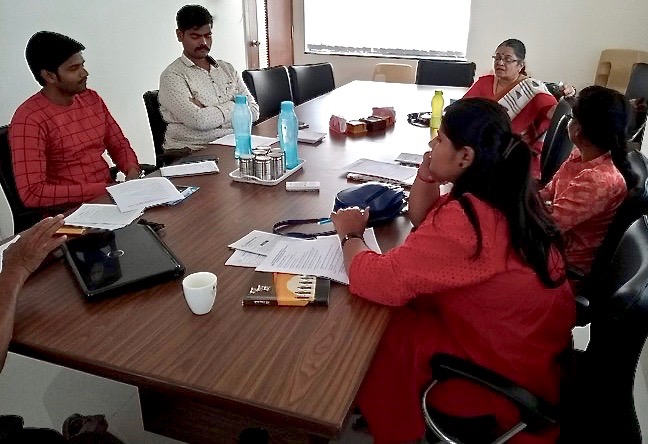
.jpg)
(L) Visitors from the We Care Foundation - Kolhapur and the Manspandan Foundation - Kolhapur attending a half-day training in the Recovery Method.
(R) Anil Vartek (3rd from left) and Smirta Godse, Joint Secretary and Treasurer of SAA (right) and the visitors
 Recovery was able to secure an information stand at Ireland's Annual National Conference of general practitioners. It was held in the Dublin Convention Centre May 2 and 3rd. Attended by about 300 GP's. We had lots of interesting conversations with GP's from all over Ireland. We provided RI brochures, meeting locations and posters to GP's.
Recovery was able to secure an information stand at Ireland's Annual National Conference of general practitioners. It was held in the Dublin Convention Centre May 2 and 3rd. Attended by about 300 GP's. We had lots of interesting conversations with GP's from all over Ireland. We provided RI brochures, meeting locations and posters to GP's.
.jpg)
Pictured Patrick (Rathgar Recovery group Dublin City) and Julia (Deansgrange Recovery group Co. Dublin)
 San Diego, CA – Area 25
San Diego, CA – Area 25

SAN DIEGO RI HONORED AS "PROGRAM OF THE YEAR"
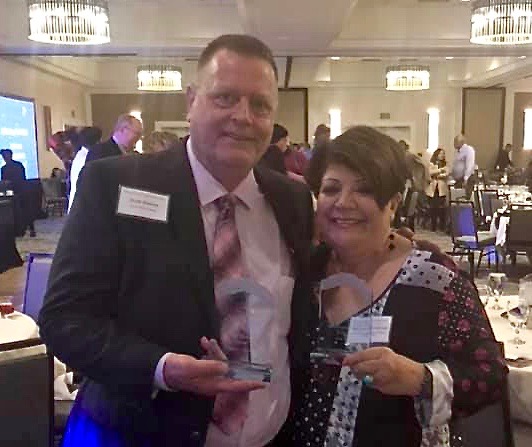
Lisa G., and Scott W., with their awards from the Behavioral Health Committee.
San Diego Area 25 was recently honored at the 33rd Annual Behavioral Health Recognition Dinner of San Diego. The event recognizes individuals and organizations who have made outstanding contributions to the behavioral health community. Recovery International Area 25 was honored as the "Educational Program of the Year."
San Diego has held RI meetings in the region for 60 years. Recent pilot projects have included trainings within the Catholic Diocese churches as well as a local synagogue. RI Meetings continue in the specialized Serial Inebriate Program which previously included only 12 step meetings. Area 25 continues to extol the virtues of RI with resource outreaches at the NAMI Walk, Survivors of Suicide Loss as well as events organized by Mental Health America, Jewish Family Services, Community Alliance of Healthy Minds and the Psychiatric Emergency Response Team for specially trained officers.
Also honored at the Recognition Dinner was Scott Waters, RI Leader at the Mariposa Clubhouse. He was awarded the Dan Reese Award. It is the highest award for advocacy given to an individual with lived experience. The Dan Reese Award is only voted on by people who have previously won it themselves. Scott is the 6th San Diego RI member to be honored with the award.
~ Kimberley M.

New York and New Jersey members at annual meeting

Pictured from right to left: Lynn, Margaret, Kathy, Beth and Carolyn. Beth is area 133 leader; Kathy and Lynn lead the Monday supplemental phone meeting; Margaret is a former phone leader.
 San Francisco Bay – Area 20
San Francisco Bay – Area 20
Our Livermore group led by Barbara S. has 2 new people coming. One of them said she heard Rob Winnike's radio show and then watched our YouTube videos. She hadn't even gone out of the house for a year and a half, but finally started going out after repetitively playing them. Finally, after a long time she got herself out to our Livermore RI meeting. She is coming every week and has used the tools to help her resolve a lot of problems in her life. Now she gives examples every week. She learned, "An insincere gesture of fellowship is better than a sincere gesture of hostility," and she decided to use that tool to end a temperamental deadlock between her and her neighbor.
Happy Summer!
![]()
Members Corner
.jpg)
.jpg)
.jpg)
.jpg)
.jpg)
In recognition of our long-time Members
.jpg)
Tell us a bit about yourself and how you came to RI.
I have been attending RI meetings for 45 years. I started in Detroit in 1973 when there were so many meetings there I could attend 2 meetings very close to my house. A friend of mine heard that Recovery had helped some new mothers with postpartum depression which I was suffering from. She took me to the first meeting. We didn’t know what to expect and she said “now if they seem crazy we can just leave”. Well they seemed much better than me, laughing and smiling and encouraging me that if I kept coming I would feel better I couldn’t understand much at the first meeting because I was so depressed but my friend (who was not depressed) thought it seemed like a good program and she bought MHTWT for me. Of course, I paid her back and started going in my own. It took a while to learn the spots and be able to concentrate on reading the book but the others were very encouraging. The first tool I learned was “that my symptoms were distressing but no dangerous “. a year or 2 later I became an assistant to a wonderful leader Gerry Smith. He first asked me to bring the refreshments.
After a year later he took me out for coffee and hot chocolate for my two preschoolers. Then he told me he was leading two meetings at the time and was really only supposed to lead one, so he asked whether I could take over the group. I thought a while and then told him if my husband agreed I guess I could do it since I came almost every week anyway. I led one year in Detroit then we moved to Orlando. I became an assistant to Kevin Wards meeting for several years then he encouraged me to open another meeting in Orlando. My parish at the time (Good Shepherd Catholic Church) allowed us to meet in their conference room. I continued to lead the group there for over 15 years & when I moved to Cocoa Beach my two assistants Trudie VanMiddlesworth and Lynette Bryant co-led the meeting for over a year until each had to give it up due to family illnesses. Then they had to close it. Two years after I moved to Cocoa Beach my parish there gave me a meeting place. We met there for several years until I had to close it during a bad setback. Fortunately, two years ago I was able to reopen the meeting at our local library. I now have had several prospective leaders & they helped me lead the group during other recent setbacks. I hope that one of them will one day take over the group once I move back to Orlando soon. Meanwhile, Lynette has reopened the Saturday meeting in Altamonte Springs that our former area leader had led for many years. When I am in Orlando I will attend her meetings I was Area leader and team leader of N and Central Florida for a few years and also a member of the leader training committee. That was a valuable experience and one that really helped me learn “to do the thing I feared to do”!I am so grateful to Recovery for helping me manage to function through the symptoms of my Bipolar disorder. It will always be a lifetime battle and I will also need professional help but Recovery gives me tools to live an average life.
Sheila R.
 Lesley has 44 years as an RI member! Happy Birthday!
Lesley has 44 years as an RI member! Happy Birthday!
Lesley S., came into RI 44 years ago, from Brooklyn, NY, because she needed help with obsessive thoughts. She eventually moved to Westchester county, where she now lives with her husband Richard. Lesley has been an assistant leader for 3 years to Barbara M., in White Plains. Her favorite spots are: Worry with reflective calm; It’s a triviality compared to my mental health; Distressing but not dangerous.
.jpg)
Our beloved member of over five decades, Ken M., of Minnesota Area 115
![]() His summation of his RI experience is: “I’ve never felt better in my life, but it took a while”
His summation of his RI experience is: “I’ve never felt better in my life, but it took a while”
Ken M. is the assistant leader and former leader of the Fridley group. He started attending RI in 1964 at a church on McCubbin Street in St. Paul MN. Ken has been an area leader for the ND, MN, and western WI area and was also the area treasurer. Previously he served as group leader for other groups in St. Paul, Robbinsdale and Fridley, Minnesota.
His favorite spots are: There are no hopeless cases; Helplessness is not hopelessness; and Your muscles will do an average job.
CONGRATULATIONS to long-time member Marianne G
Marianne G., is the leader at the Palatine, Illinois meeting at 10AM on Saturday mornings. She's been a member of Recovery since 1988. Marianne is able to function all day and fulfill her everyday obligations. Her favorite spot is "It's distressing but not dangerous." She recommends Recovery because it is a self-help group that allows its members to become realists rather than romanticists.

Call for submissions!
Have you or someone you know dedicated 25 or more years to practicing the RI Method?
Help us honor our longtime members here in Members Corner! We are going to feature our long-serving heroes in each issue of the Reporter.
Send us:
- A photo
- What challenge/problem did RI solve for you?
- What are your favorite spots?
- Why would you recommend RI?
- Highlight the meeting you attended (City, day, time and any leadership roles taken on)
Send descriptions to: editor@recoveryinternational.org
Mailed items should be sent to Headquarters:
Recovery International
1415 W. 22nd St., Tower Floor
Oak Brook IL 60523
General Submission guidelines:
- Please keep submissions as short as possible, roughly 3 paragraphs in length (approximately 300 words).
- Please identify all submissions with first name and last name initial only, area number (if you know it), town, and state or country.
- Photos: Please if possible submit clear, black and white photos whenever possible.
- Please no bold or italics.
- Please adhere to the deadlines for each issue.
- When the volume of submissions exceeds our page limits, it may be unfortunately necessary to exclude some submissions.
- Please send only submissions pertinent to the Recovery Reporter
PRIVACY: To protect the privacy and confidentiality of all members, please use only first name and the initial of the last name of people. Please be aware that the content you submit is NOT private because we cannot control how it is shared and therefore it may be accessible to the public.
Send questions, comments, examples and other news for the next Reporter to editor@recoveryinternational.org.
The views and opinions expressed by authors of articles appearing in the Reporter are those of the author of those articles and they are not necessarily the views and opinions of Recovery International or anyone affiliated with Recovery International.
Reminder
If your email or address changes please be sure to notify us. If you are a Canadian member you should also notify Cindy Hutchins at purple74@xplornet.com.
If you, or someone you know, is a paid member and isn’t receiving the Reporter, please let us know at info@recoveryinternational.org
.jpg)
.jpg)
.jpg)
.jpg)
.jpg)
ALL Members! Please feel free to submit poems and musings celebrating how RI has made a difference in your everyday life to: editor@recoveryinternational.org We will post when space permits, thank you!
Submit Cancel NeonCRM Copyright © 2019 Neon One, LLC. All rights reserved.

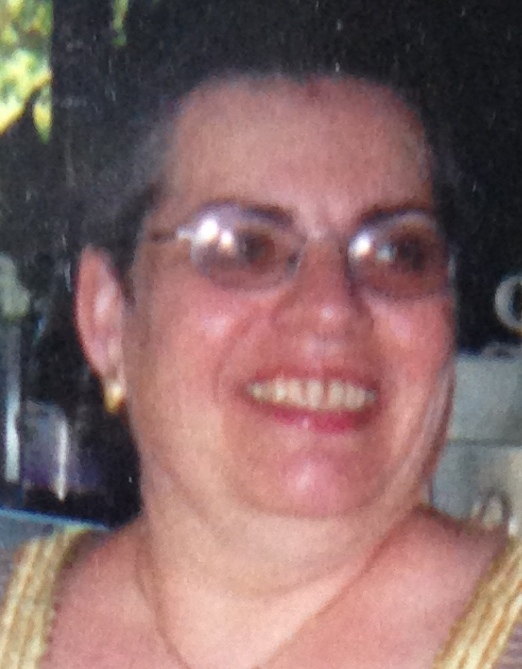
.jpg)
.jpg)
